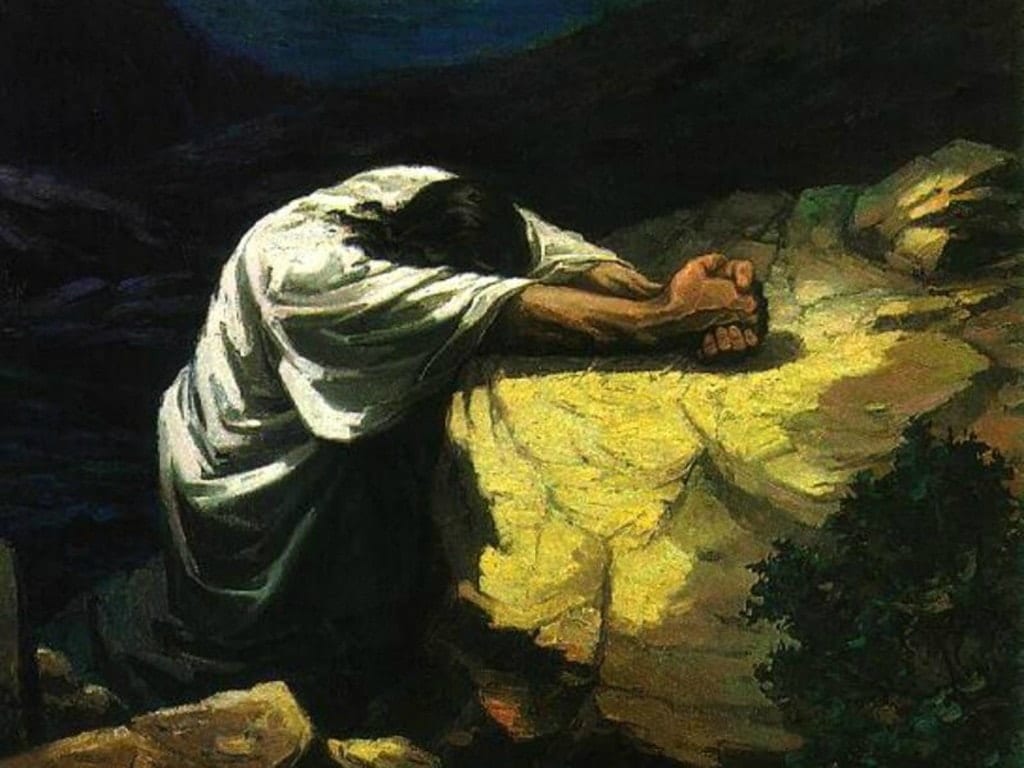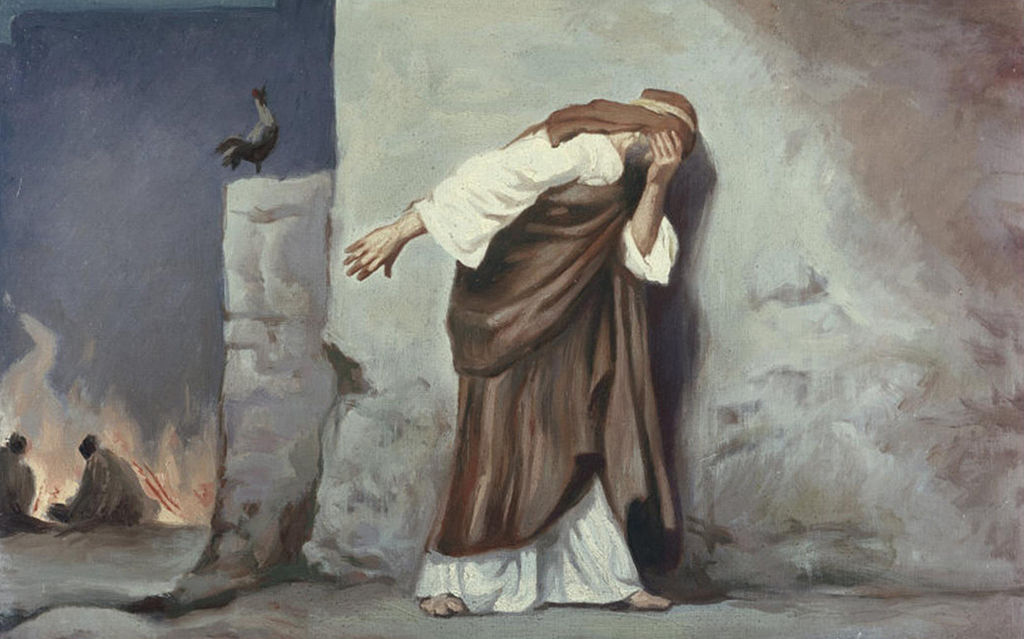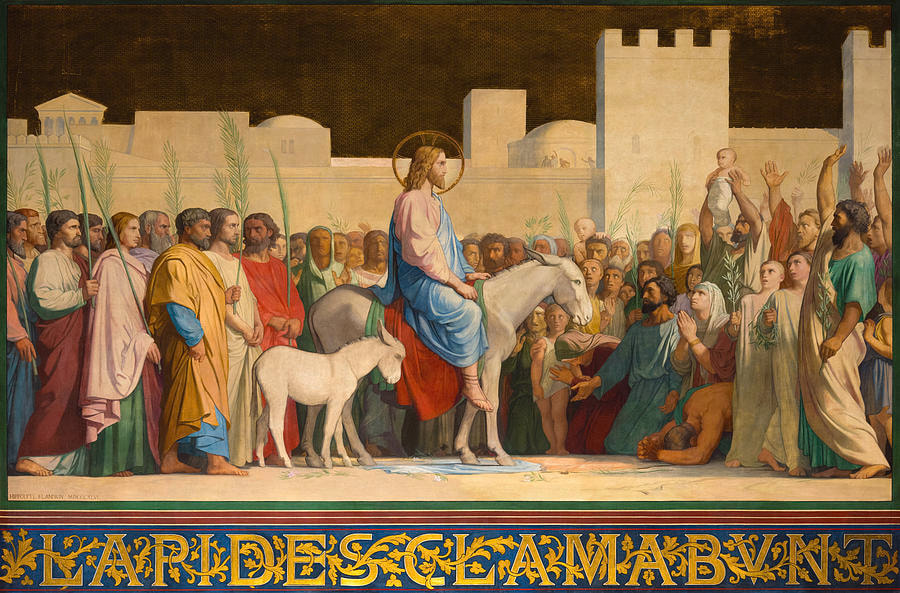Daily Music for Holy Week
Note: because our visitors come from both hemispheres, we put up each piece of music a day in advance.
Note: because our visitors come from both hemispheres, we put up each piece of music a day in advance.
HOLY SATURDAY
"Were you there when they crucified my Lord?"
"Were you there when they crucified my Lord?"
Very moving rendition of this well known spiritual by the Gospel ensemble, Three Mo' Tenors. Victor Trent Cook is the soloist, supported by Rodrick Dixon, and Thomas Young.
GOOD FRIDAY
"O MY PEOPLE, WHAT HAVE I DONE TO THEE?"
Tomás Luis de Victoria (1585)
This is the full liturgical version of the Reproaches for Good Friday, part of the Tenebrae (Darkness) service. In one of the most moving renditions of de Victoria's work, it is sung here in English by the choir of the Anglican Church of the Advent, Boston.
Tomás Luis de Victoria (1585)
This is the full liturgical version of the Reproaches for Good Friday, part of the Tenebrae (Darkness) service. In one of the most moving renditions of de Victoria's work, it is sung here in English by the choir of the Anglican Church of the Advent, Boston.
The Reproaches: Popule meus, Tomás Luis de Victoria (1548-1611)
R. O my people, what have I done unto thee, or wherein have I wearied thee? Testify against me.
V. Because I brought thee forth from the land of Egypt: thou hast prepared a Cross for thy Saviour.
R. Hagios O Theos. Holy God. Hagios ischyros. Holy, Mighty. Hagios athanatos, eleison hymas. Holy and Immortal, have mercy upon us.
V. Because I led thee through the desert forty years, and fed thee with manna, and brought thee into a land exceeding good: thou hast prepared a Cross for thy Saviour.
R. Hagios O Theos. Holy God. Hagios ischyros. Holy, Mighty. Hagios athanatos, eleison hymas. Holy and Immortal, have mercy upon us.
V. What more could I have done for thee that I have not done? I indeed did plant thee, O my vineyard, with exceeding fair fruit: and thou art become very bitter unto me: for vinegar, mingled with gall, thou gavest me when thirsty: and hast pierced with a spear the side of thy Saviour.
R. Hagios O Theos. Holy God. Hagios ischyros. Holy, Mighty. Hagios athanatos, eleison hymas. Holy and Immortal, have mercy upon us.
V. I did scourge Egypt with her first-born for thy sake: and thou hast scourged me and delivered me up.
R. O my people, what have I done unto thee, or wherein have I wearied thee? Testify against me.
V. I led thee forth out of Egypt, drowning Pharaoh in the Red Sea: and thou hast delivered me up unto the chief priests.
R. O my people, what have I done unto thee, or wherein have I wearied thee? Testify against me.
V. I did open the sea before thee: and thou hast opened my side with a spear.
R. O my people, what have I done unto thee, or wherein have I wearied thee? Testify against me.
V. I did go before thee in the pillar of cloud: and thou hast led me unto the judgment hall of Pilate.
R. O my people, what have I done unto thee, or wherein have I wearied thee? Testify against me.
V. I did feed thee with manna in the desert: and thou hast stricken me with blows and scourges.
R. O my people, what have I done unto thee, or wherein have I wearied thee? Testify against me.
V. I did give thee to drink the water of life from the rock: and thou hast given me to drink but gall and vinegar.
R. O my people, what have I done unto thee, or wherein have I wearied thee? Testify against me.
V. I did smite the kings of the Canaanites for thy sake: and thou hast smitten my head with a reed.
R. O my people, what have I done unto thee, or wherein have I wearied thee? Testify against me.
V. I did give thee a royal scepter: and thou hast given unto my head a crown of thorns.
R. O my people, what have I done unto thee, or wherein have I wearied thee? Testify against me.
V. I did raise thee on high with great power: and thou hast hanged me upon the gibbet of the Cross.
R. O my people, what have I done unto thee, or wherein have I wearied thee? Testify against me.
R. O my people, what have I done unto thee, or wherein have I wearied thee? Testify against me.
V. Because I brought thee forth from the land of Egypt: thou hast prepared a Cross for thy Saviour.
R. Hagios O Theos. Holy God. Hagios ischyros. Holy, Mighty. Hagios athanatos, eleison hymas. Holy and Immortal, have mercy upon us.
V. Because I led thee through the desert forty years, and fed thee with manna, and brought thee into a land exceeding good: thou hast prepared a Cross for thy Saviour.
R. Hagios O Theos. Holy God. Hagios ischyros. Holy, Mighty. Hagios athanatos, eleison hymas. Holy and Immortal, have mercy upon us.
V. What more could I have done for thee that I have not done? I indeed did plant thee, O my vineyard, with exceeding fair fruit: and thou art become very bitter unto me: for vinegar, mingled with gall, thou gavest me when thirsty: and hast pierced with a spear the side of thy Saviour.
R. Hagios O Theos. Holy God. Hagios ischyros. Holy, Mighty. Hagios athanatos, eleison hymas. Holy and Immortal, have mercy upon us.
V. I did scourge Egypt with her first-born for thy sake: and thou hast scourged me and delivered me up.
R. O my people, what have I done unto thee, or wherein have I wearied thee? Testify against me.
V. I led thee forth out of Egypt, drowning Pharaoh in the Red Sea: and thou hast delivered me up unto the chief priests.
R. O my people, what have I done unto thee, or wherein have I wearied thee? Testify against me.
V. I did open the sea before thee: and thou hast opened my side with a spear.
R. O my people, what have I done unto thee, or wherein have I wearied thee? Testify against me.
V. I did go before thee in the pillar of cloud: and thou hast led me unto the judgment hall of Pilate.
R. O my people, what have I done unto thee, or wherein have I wearied thee? Testify against me.
V. I did feed thee with manna in the desert: and thou hast stricken me with blows and scourges.
R. O my people, what have I done unto thee, or wherein have I wearied thee? Testify against me.
V. I did give thee to drink the water of life from the rock: and thou hast given me to drink but gall and vinegar.
R. O my people, what have I done unto thee, or wherein have I wearied thee? Testify against me.
V. I did smite the kings of the Canaanites for thy sake: and thou hast smitten my head with a reed.
R. O my people, what have I done unto thee, or wherein have I wearied thee? Testify against me.
V. I did give thee a royal scepter: and thou hast given unto my head a crown of thorns.
R. O my people, what have I done unto thee, or wherein have I wearied thee? Testify against me.
V. I did raise thee on high with great power: and thou hast hanged me upon the gibbet of the Cross.
R. O my people, what have I done unto thee, or wherein have I wearied thee? Testify against me.
HOLY THURSDAY
Image: Peter's Denial by Robert Leinweber (1845-1921)
The "Erbarme Dich" aria is the emotional heart of Bach's monumental St Matthew Passion. It is said to be one of Pope Francis's favourite pieces of music. The cock crows and Peter, having denied any involvement with Jesus, remembers Jesus' words: “before the cock crows, you will deny me three times.”
It is sung here with piercing sorrow by the great American contralto, Marian Anderson, in a recording from 1946.
ERBARME DICH: HAVE MERCY, MY GOD!
Erbarme dich, mein Gott,
Um meiner Zähren willen!
Schaue hier, Herz und Auge
Weint vor dir bitterlich.
Erbarme dich, mein Gott.
Have mercy, my God,
For the sake of my tears!
See here, before you
Heart and eyes weep bitterly.
Have mercy, my God.
It is sung here with piercing sorrow by the great American contralto, Marian Anderson, in a recording from 1946.
ERBARME DICH: HAVE MERCY, MY GOD!
Erbarme dich, mein Gott,
Um meiner Zähren willen!
Schaue hier, Herz und Auge
Weint vor dir bitterlich.
Erbarme dich, mein Gott.
Have mercy, my God,
For the sake of my tears!
See here, before you
Heart and eyes weep bitterly.
Have mercy, my God.
'SPY' WEDNESDAY
Then one of the Twelve, the man called Judas Iscariot, went to the chief priests and said, 'What are you willing to give me if I hand him over to you?'
Then one of the Twelve, the man called Judas Iscariot, went to the chief priests and said, 'What are you willing to give me if I hand him over to you?'
Gregorio Allegri's truly haunting Miserere, a setting of Psalm 51 (50) is sung here by one of the world's most renowned choral ensembles, The Sixteen, directed by Harry Christophers.
TUESDAY IN HOLY WEEK

'Timor et Tremor': The first of Poulenc's Four Lenten Motets is sung here by The Sixteen, directed by Harry Christophers.
TEXT
Timor et tremor venerunt super me, et caligo cecidit super me: miserere mei Domine, quoniam in te confidit anima mea.
Exaudi Deus deprecationem meam quia refugium meum es tu adjutor fortis. Domine, invocavi te, non confundar.
Fear and trembling have taken hold of me; the darkness has come upon me. Have mercy on me, O Lord; have mercy, for my soul has trusted in you. Hear, O Lord, my prayer for you are my refuge and strength. Lord I have called upon you: let me never be put to shame.
TEXT
Timor et tremor venerunt super me, et caligo cecidit super me: miserere mei Domine, quoniam in te confidit anima mea.
Exaudi Deus deprecationem meam quia refugium meum es tu adjutor fortis. Domine, invocavi te, non confundar.
Fear and trembling have taken hold of me; the darkness has come upon me. Have mercy on me, O Lord; have mercy, for my soul has trusted in you. Hear, O Lord, my prayer for you are my refuge and strength. Lord I have called upon you: let me never be put to shame.
MONDAY OF HOLY WEEK
Today's Gospel reading describes the anointing of Jesus by Mary of Bethany.
The Woman with the Alabaster Box is a beautiful interpretation of the narrative by contemporary Estonian composer, Arvo Pärt. The lyrics are included. It is sung here by The Sixteen, directed by Harry Christophers.
The Woman with the Alabaster Box is a beautiful interpretation of the narrative by contemporary Estonian composer, Arvo Pärt. The lyrics are included. It is sung here by The Sixteen, directed by Harry Christophers.
PALM SUNDAY OF THE LORD'S PASSION
Image: Christ's Entry to Jerusalem by Jean-Hippolyte Flandrin (painted 1842-48). Courtesy of Church of Saint-Germain-des-Prés, Paris.
Malcolm Williamson was born in Sydney in 1931. He studied composition and horn at the Sydney Conservatorium of Music. In 1950 he moved to London where he worked as an organist, a proofreader, and a nightclub pianist. A convert to Catholicism in 1952, he became Master of the Queen's Musick in 1975.
The seldom heard Procession of Palms is a wonderful little piece in three sections: 1. 'Ride on in majesty' (you can almost see the donkey clip-clopping along!); 2. 'All Glory, Laud and Honour'; and 3. 'Benedictus qui venit'. It is performed here by The Mastersingers, conducted by Alan Simmons, with the composer playing the organ. It was recorded in St Catharine’s College, Cambridge.
Bring the volume up loud to get the full impact!
Malcolm Williamson was born in Sydney in 1931. He studied composition and horn at the Sydney Conservatorium of Music. In 1950 he moved to London where he worked as an organist, a proofreader, and a nightclub pianist. A convert to Catholicism in 1952, he became Master of the Queen's Musick in 1975.
The seldom heard Procession of Palms is a wonderful little piece in three sections: 1. 'Ride on in majesty' (you can almost see the donkey clip-clopping along!); 2. 'All Glory, Laud and Honour'; and 3. 'Benedictus qui venit'. It is performed here by The Mastersingers, conducted by Alan Simmons, with the composer playing the organ. It was recorded in St Catharine’s College, Cambridge.
Bring the volume up loud to get the full impact!



